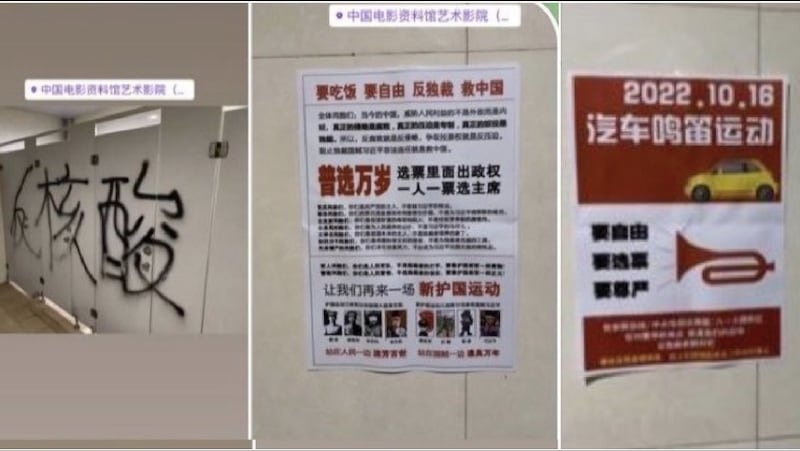Amid a rare public protest during the Chinese Communist Party's 20th National Congress, Chinese nationals who amplify or respond to anti-Xi Jinping feeling said they are increasingly concerned about bringing trouble down on the heads of loved ones back home.
Overseas social media among the Chinese diaspora -- where information flows more freely than inside the Great Firewall of internet censorship -- has been abuzz with the news of a protester who hung a banner calling for the removal of leader Xi Jinping on a Beijing overpass on the eve of the party congress.
While censors of China's tightly-controlled internet quickly deleted posts, comments and accounts mentioning the banners, many outside the country hailed the man, named as Peng Lifa, as a hero.
Slogans and comments expressing solidarity with the "bridge man" protest began appearing on college bulletin boards outside China, including the University of Illinois Urbana-Champaign, the University of Chicago, New York University, Johns Hopkins, Emory and McGill, as well as at UCL and Central Saint Martins College of Art and Design in London and at Seoul's Korea University.
Many of the comments were supportive of the protest, but anonymous, according to a U.S.-based Chinese student who gave only the surname Wang, for fear of compromising loved ones back home.
"Most of them are Chinese nationals with most of their friends and family back in China, so they want to make sure they're not affected [by their comments overseas]," Wang told RFA.
Wang said Chinese students also fear being contacted by officials from their local Chinese embassy or consulate, or being reported to authorities by one of their Chinese classmates.
Some anonymous solidarity with Peng's protest has also been spotted in China, where public signs of dissent are extremely rare and punishable by detention and jail, or other forms of official retaliation like incarceration in a psychiatric hospital like Dong Yaoqiong, a young woman who splashed ink on a public portrait of Xi Jinping on July 4, 2018.

Photos of anti-Xi graffiti scrawled in public toilets in mainland China echoing Peng's call for direct elections, an end to the zero-COVID policy and to Xi's dictatorship have been circulating on Twitter since last week.
One of the photos said the graffiti was seen in the men's toilets of the Beijing Film Archive movie theater.
Another, which largely repeated the slogans on one of Peng's banners, was attributed to the men's toilets at the Nanhu Interchange on the Chengdu Metro, in the provincial capital of the southwestern province of Sichuan.
"Free Chengdu, revolution now!" the slogan added, in a variation on the signature slogan of the 2019 anti-extradition and pro-democracy protests in Hong Kong.
Social media users posted photos of similar graffiti in Xuzhou, in the eastern province of Jiangsu.
As local governments started hastily hiring guards to post a round-the-clock watch on all traffic flyovers in Beijing for the duration of the party congress, the Beijing police department issued an order to print and photocopying shops requiring them to review all content before printing orders.
"All printed and copied material must be reviewed by store staff," said the order, a copy of which was circulating on social media.
Unconfirmed reports that anyone buying paint or more than a foot of fabric in Beijing must now register with their real names have also been circulating on social media. RFA was unable to verify the reports independently.
Overseas Solidarity
Chinese internet celebrity Xu Qingen, who currently lives in France, said he was among the first to support Peng's protest openly.
"I was the first to speak up for Mr. Peng, because it is very difficult for people in China to speak up for him," Xu told RFA. "Chinese abroad need to lend their unconditional support ... because they have the geographical advantage of being relatively free."
"Not like in China, where the CCP has total control over public discourse and ideology, and over the whole country," he said.
U.K.-based rights activist Wang Jianhong agreed. "This kind of overseas solidarity is very, very, very important," Wang told RFA. "It's great to see. Anyone who still cares about China's future ... and also about their parents back in their hometown, should do something."
"The Sitong Bridge protest touched people deeply, because everyone feels the same about the harms of the zero-COVID policy," she said. "If there is no freedom at this point, then anyone could wind up dying in a quarantine hospital. The lack of food and emergency medical treatment affects everyone in China."
The protester, seen in a video being loaded into a police car Thursday, has been named as Peng Lifa. He used the handle Peng Zaizhou on social media in a reference to an ancient essay describing the people as the water that holds up the boat of government, and might overturn it if they are unhappy with its rule.
While RFA has been unable to confirm the identity of the protester independently, content posted earlier to Peng's social media accounts was consistent with the tone of his banners, which were displayed from the Sitong flyover on Beijing's Third Ring Road on Thursday.
"Remove the traitor-dictator Xi Jinping!" read one banner, video and photos of which were quickly posted to social media, only to be deleted. A post linked from the account called for strikes and class boycotts to remove Xi.
"Food, not PCR tests. Freedom, not lockdowns. Reforms, not the Cultural Revolution. Elections not leaders," read the second, adding: "Dignity, not lies. Citizens, not slaves."
Translated and edited by Luisetta Mudie.
